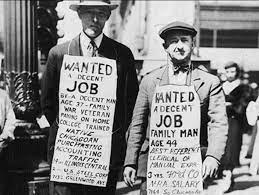A Great Depression is a period of severe economic hardship characterized by high levels of unemployment, periods of poverty, and economic decline. The most famous Great Depression occurred in the 1930s, but the world economy is signaling there could be another Great Depression on the horizon.
In the face of such a crisis, it is essential to have a Great Depression plan in place to survive the hardships, shortages of food and the difficult times ahead. If you fail to plan, then you plan to fail. So here are our key tips to help you build your…

Create A Great Depression Plan:
- Build a Financial Safety Net
One of the most important steps in surviving a Great Depression is building your financial safety. This involves creating an emergency fund that can help you cover your expenses during tough times. Ideally, aim to have enough money saved up to cover six months of expenses. This money can be used to pay for essential expenses such as rent, utilities, and groceries.
- Reduce Your Debt
During a Great Depression, debt can become a major burden. It is essential to reduce your debt as much as possible, so you do not have to worry about making payments when you are struggling to make ends meet. Start by paying off high-interest debt such as credit cards and personal loans.
You can likely consolidate your debt into a single loan with a lower interest rate. If you are struggling to make your payments, contact your creditors and ask for a payment plan.
Consider down-sizing your home or car to reduce the amount of debt or even to help pay it off entirely.
- Cut Your Expenses
In times of economic hardship, it is essential to cut your expenses as much as possible. Start by creating a budget and identifying areas where you can cut back.
For example, you can reduce your expenses by eating at home more, cancelling subscription services, and negotiating lower bills for services like cable or internet. Every dollar you save will help you weather the financial storm.
The sooner your start the more you can save toward your safety net target.
Other areas you may be able to save include cutting your families hair at home, growing your own food, buying in bulk, making bigger meals to put excess into the freezer and visiting thrift shops.
- Diversify Your Income
During a Great Depression, jobs can be scarce, and incomes can be unstable. It is essential to diversify your income streams to protect yourself from a sudden loss of income. Consider starting a side business or taking on freelance work.
You can also look for part-time work or take on odd jobs to bring in extra income.
Additionally you could start selling unwanted items for extra cash while the markets are still good.
- Learn New Skills
During a Great Depression, it is important to be flexible. Learning new skills now will help you be adaptable and stay competitive in the job market. Unemployment will rise significantly, so having options and making yourself more valuable are crucial.
Consider online courses, attending workshops, or volunteering in your community to increase your skills and knowledge.
Additionally, generally handy skills can help you cut costs to fix and repair things in and around the home and provide you with a way to help your community.
- Investing in Tangible Assets
During a Great Depression, financial markets will be volatile, and traditional investments like stocks and bonds are likely lose value. If you have extra cash now, it is important to invest in assets that can retain their value. Real estate, precious metals, and collectibles are tangible assets which will hold better value and are easier to trade when needed.
These assets can provide a hedge against inflation and help protect your wealth during the tough times.
- Stay Positive and Connected
Finally, it is essential to stay positive and connected during a Great Depression. Surround yourself with positive and supportive people who can help you through the tough times. Take care of your physical and mental health by exercising, eating well, and getting enough sleep.
Remember that tough times do not last forever, and with the right strategies and mindset, you can survive and thrive.
Community can be one of the most valuable assets of all. You can share resources, grow different foods, help each other and share experiences, skills and knowledge.

Surviving a Great Depression is a difficult task and requires careful preparation and planning, some good luck and help from those around you.
By having a Great Depression Plan ahead of time, you significantly improve your chances and can ensure you have a financial safety net, reduced debt, have cut expenses, diversified your income, learned new skills and invested in tangible assets.
These steps will help prepare you, give you a significant advantage, help you to stay positive and cultivate connections in your community to insure the best possible outcome for you and your family during a Great Depression.
As they say, if you fail to plan, then you plan to fail.
Good luck with your Great Depression Plan!